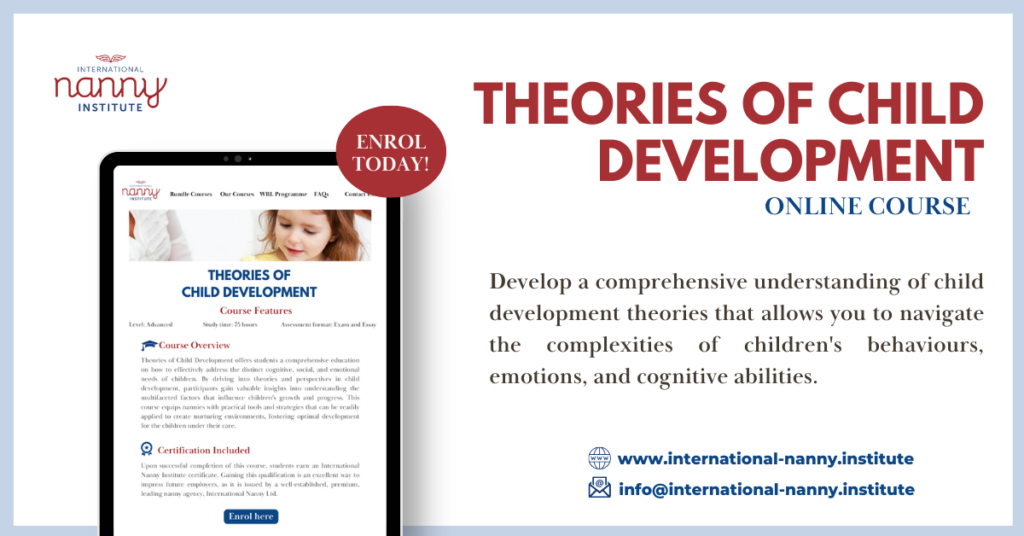As a professional nanny, one of your most important responsibilities is to support the cognitive development of the children in your care. Cognitive development encompasses the growth of a child’s mental processes, including their ability to think, perceive, remember, learn, and problem-solve. By understanding the key theories and principles of cognitive development, you can create an enriching environment that fosters intellectual growth and paves the way for academic success.

Piaget’s Theory of Cognitive Stages
One of the most influential theories in the field of cognitive development is that of Jean Piaget. Piaget proposed that children progress through four distinct stages of cognitive development, each characterised by specific mental abilities and ways of understanding the world.
The four stages are:
- Sensorimotor Stage (0-2 years): During this stage, infants and toddlers explore the world through their senses and physical actions, gradually developing object permanence and basic problem-solving skills.
- Preoperational Stage (2-7 years): Preschoolers in this stage develop symbolic thinking, language, and the ability to engage in pretend play, but their thinking remains limited and egocentric.
- Concrete Operational Stage (7-11 years): Elementary school-aged children in this stage can think logically about concrete, real-world objects and events, and they begin to develop more advanced problem-solving abilities.
- Formal Operational Stage (11-18 years): Adolescents in this stage can engage in abstract, hypothetical, and logical thinking, allowing them to consider multiple perspectives and plan for the future.

Nannies can help support cognitive development by providing age-appropriate activities, toys, and experiences that align with each child’s stage of cognitive growth. For example, during the sensorimotor stage, you might offer rattles, blocks, and other hands-on manipulatives, while in the preoperational stage, you could encourage imaginative play and storytelling.
The Importance of Scaffolding
Another key principle in cognitive development is the concept of scaffolding, introduced by psychologist Lev Vygotsky. Scaffolding refers to the process of providing temporary, tailored support to a child as they work to achieve a new skill or understanding that is just beyond their current level of ability.
As a nanny, you can implement scaffolding by:
- Observing a child’s current capabilities and the next steps in their learning
- Offering guidance, prompts, or tools to help the child progress
- Gradually withdrawing support as the child becomes more independent
- Providing encouragement and praise to boost the child’s confidence and motivation

By scaffolding the learning process, you can help children develop critical-thinking skills, problem-solving abilities, and a growth mindset, ultimately preparing them for success in school and beyond.
Fostering Cognitive Stimulation
In addition to aligning your approach with Piaget’s stages and the principles of scaffolding, there are various ways you can create a cognitively stimulating environment for the children in your care. This may include:
- Engaging in rich conversations and open-ended questioning
- Introducing educational toys, puzzles, and hands-on learning materials
- Encouraging creativity, imagination, and exploration through play
- Incorporating learning opportunities into daily routines and activities
- Exposing children to a variety of books, music, and cultural experiences

By nurturing cognitive development through these strategies, you can help the children in your charge reach their full intellectual potential and develop the foundation for lifelong learning and success.
As a professional nanny, your role in cultivating the cognitive development of the children in your care is truly invaluable. Deepen your understanding of the key theories and principles that underpin intellectual growth by enrolling in International Nanny Institute’s “Theories of Child Development” course. This course will empower you to create learning environments that ignite the spark of curiosity, problem-solving, and critical thinking in the young minds you nurture. Invest in your professional development and watch as the children you serve blossom into confident, lifelong learners, poised for academic and personal success.



